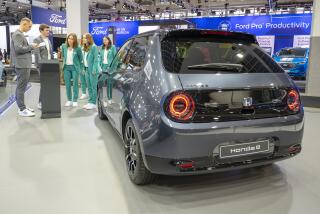Toyota to Explore Plug-In Hybrids
- Share via
Toyota Motor Corp. said Tuesday that it intended to increase research into plug-in hybrid technology, which it once derided, and to double the number of conventional hybrid models it sells globally by early next decade.
The Japanese automaker, poised to overtake General Motors Corp. as the world’s largest automaker by sales volume, presented a far-reaching look at its fuel-efficiency and environmental goals.
In addition to increasing to 14 the number of gasoline-electric hybrid models it offers, Toyota said, it planned to offer more-fuel-efficient gasoline engines and to offer its first engines that can burn mixtures of ethanol and gasoline.
The moves come as Toyota, like other automakers, gears up to compete in a world of soaring gasoline prices, diminishing supplies of easily obtainable crude oil and increased political and social pressure to reduce oil consumption and auto emissions.
Ethanol can be made from corn, sugar cane or other plant material. The first ethanol engines from Toyota -- which lags behind GM in this area -- are to be introduced next year in Brazil, which has a nationwide system for distributing the fuel. Toyota also is considering ethanol engines for the U.S., company President Katsuaki Watanabe said at a briefing in Tokyo.
The initiatives outlined Tuesday, though “evolutionary rather than revolutionary,” show that Toyota intends to remain a global leader in fuel efficiency, emission reduction and hybrids, said Anthony Pratt, senior powertrain systems analyst for J.D. Power & Associates in Westlake Village.
Toyota’s plans were not cheered by everyone.
“Don’t tell me about the technologies -- tell me how you will use them to reduce global warming pollution,” said Roland Hwang, Berkeley-based vehicle program director for the Natural Resources Defense Council. “That’s what’s missing here.”
Toyota has increased its U.S. market share in part by adding large sport utility vehicles and pickups. The bigger trucks are less fuel-efficient than other Toyotas, and the company’s average fuel economy has dropped about 2 miles per gallon in the last decade to 23.5 mpg last year.
That’s second-best in the U.S., trailing only Honda Motor Co.’s 25.1 mpg average. “But it still means they’re behind where they were in 1985,” Hwang said, despite Toyota’s introduction of hybrids and other fuel-efficiency technologies.
Watanabe said, however, that Toyota did intend to improve overall fuel economy through the new initiatives.
Environmentalists are concerned because gasoline engines produce carbon dioxide, a major contributor to global warming, and the less fuel consumed per mile traveled, the lower the emissions.
Hybrids, which combine conventional internal-combustion engines with electric motors for improved fuel efficiency, have won favor with environmentalists. But many hope to persuade automakers to develop plug-in versions, which use larger battery packs that the owner can recharge by connecting an onboard charger to a common wall socket.
Such vehicles -- championed by Southern California engineers who have retrofitted Toyota’s bestselling Prius on their own -- could travel 40 or more miles at highway speeds solely on electric power before the gasoline engine would cut in and the vehicles would revert to operating as conventional hybrids.
Because the urban driver commutes less than 40 miles a day on average, much of a plug-in hybrid’s life cycle would be spent in all-electric mode, thus reducing gasoline consumption.
Watanabe’s promise to increase research into the technology “was a little surprising, and pretty fabulous,” said Greg Hanssen, vice president of Energy CS, a Monrovia company that converts Prius models into plug-in versions.
“I always thought battery costs would have to come down a lot more, and fuel prices would have to go up a lot more, for this to click with Toyota,” he said. “So maybe this means they think both are going to happen sooner than later.”
Although Watanabe stopped short of promising to bring a plug-in hybrid to market, he did say Toyota “is getting close” to achieving a 50% reduction in the development and production costs of conventional hybrid systems for its upcoming models.
That could lead to a steep cut in the so-called hybrid premium, which adds $3,000 to $9,000 to the sticker price of models Toyota sells in the U.S.






